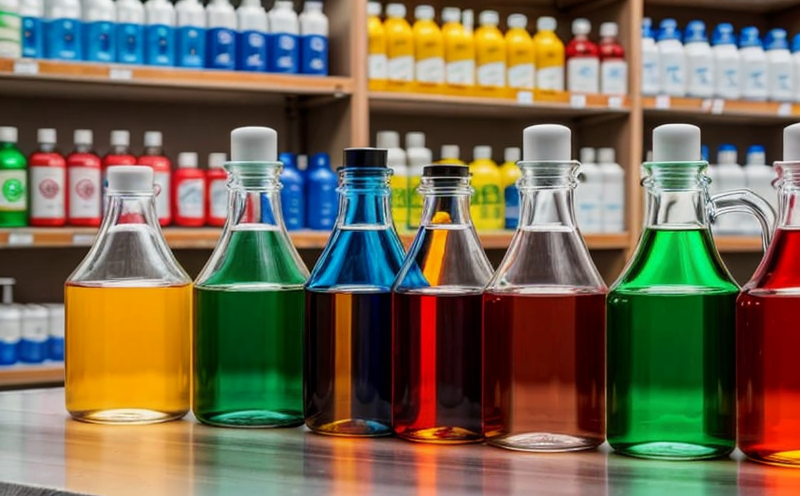ASTM D6806 Determination of bisphenol A in consumer products
The determination of Bisphenol A (BPA) in consumer products is a critical aspect of ensuring the safety and compliance with international standards. BPA, a synthetic chemical used primarily as an epoxy resin hardener, has been a subject of extensive research due to concerns over its potential adverse effects on human health and the environment.
ASTM D6806 provides a standardized method for quantifying bisphenol A in consumer products using liquid chromatography with tandem mass spectrometry (LC-MS/MS). This technique allows for accurate detection down to parts per billion, making it suitable for both routine quality control and regulatory compliance.
The testing process begins with the selection of appropriate sample matrices such as plastics, coatings, or adhesives. Once collected, these samples undergo thorough preparation which includes extraction methods tailored to each specific matrix type. For instance, polar solvents like acetonitrile are commonly used for extracting BPA from plastic products.
After extraction, the samples are subjected to liquid chromatography where they flow through a stationary phase that separates different components based on their physical and chemical properties. Tandem mass spectrometry then identifies each separated compound by comparing its mass-to-charge ratio with known standards.
This method ensures high precision and accuracy, which is essential for meeting stringent regulatory requirements set forth by various authorities including the European Union's REACH regulations or the Canadian Environmental Protection Act.
The importance of this test cannot be overstated. BPA exposure has been linked to numerous health issues ranging from reproductive disorders in adults to developmental problems in children. By ensuring compliance with ASTM D6806, manufacturers can protect consumers while also avoiding potential legal liabilities and reputational damage associated with non-compliance.
Additionally, this testing contributes significantly towards sustainability efforts by helping industries transition away from harmful chemicals towards more eco-friendly alternatives. It supports the development of safer products that meet global standards for both human health and environmental protection.
- Enhanced Product Safety: Ensures compliance with international safety standards.
- Better Regulatory Compliance: Helps avoid fines and penalties from regulatory bodies.
Why It Matters
The need to determine bisphenol A in consumer products arises due to growing public awareness about chemical safety. As consumers become more informed, they demand transparency regarding the materials used in everyday items like toys, food containers, and packaging.
BPA has been widely used in various applications including polycarbonate plastics and epoxy resins lining cans containing acidic foods or beverages. However, studies have shown that BPA can leach into these products under certain conditions, posing risks especially when ingested by infants through baby bottles made of polycarbonate plastic.
Regulatory bodies around the world are implementing stricter regulations to minimize human exposure to this potentially harmful substance. For example, the European Union has banned its use in children's feeding bottles and other similar items intended for young children. Similarly, China has also restricted BPA usage in certain categories of food contact materials.
Conducting ASTM D6806 tests helps manufacturers stay ahead of these regulatory changes ensuring that their products continue to meet evolving standards without compromising quality or performance.
Benefits
- Avoid Legal Penalties: Compliance with ASTM D6806 prevents costly fines and legal issues related to non-compliance.
- Increase Consumer Trust: Demonstrates commitment to product safety, enhancing brand reputation among customers.
- Promote Sustainable Practices: Encourages the adoption of safer alternatives in manufacturing processes.
Beyond avoiding penalties and increasing trust, adopting ASTM D6806 also fosters sustainable practices. By identifying BPA levels early during production stages, companies can make informed decisions about material selection and process improvements leading to more environmentally friendly operations. This proactive approach not only benefits the immediate product but also contributes positively towards long-term sustainability goals.
Environmental and Sustainability Contributions
The determination of bisphenol A in consumer products through ASTM D6806 plays an important role in environmental conservation efforts. Reducing or eliminating BPA from manufacturing processes helps lower overall chemical pollution levels, thereby protecting aquatic ecosystems and wildlife.
BPA contamination can lead to hormonal disruptions in fish and other marine life which may result in reproductive failures or developmental abnormalities. By adhering to ASTM D6806 guidelines, industries contribute towards preserving biodiversity by minimizing environmental impact.
- Reduces Chemical Pollution: Minimizes the release of harmful substances into water bodies and soil.
- Promotes Eco-friendly Innovations: Encourages research and development of BPA-free materials enhancing overall industry sustainability.
Moreover, this testing supports broader initiatives aimed at reducing waste generation. With accurate detection capabilities provided by ASTM D6806, companies can better manage their waste streams ensuring proper disposal methods are employed rather than releasing hazardous substances into nature.





